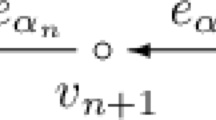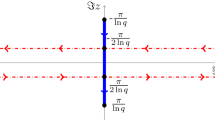Abstract
The Unitary Dual Problem is one of mathematics’ most important open problems: classify the irreducible unitary representations of a group. The general approach has been to classify all representations admitting non-degenerate invariant Hermitian forms, compute the signatures of those forms, and then determine which forms are positive definite. Signature character algorithms and formulas arising from deforming representations and analysing changes at reducibility points, as in Adams et al. (Unitary representations of real reductive groups (ArXiv e-prints), 2012) and Yee (Represent Theory 9:638–677, 2005), produce very complicated formulas or algorithms from the resulting recursion. This paper shows that in the case of irreducible Verma modules all of the complexity can be encapsulated by the affine Hecke algebra: for compact real forms and for alcoves corresponding to translations of the fundamental alcove by a regular weight, signature characters of irreducible Verma modules are in fact “negatives” of Hall–Littlewood polynomial summands evaluated at \(q=-\,1\) times a version of the Weyl denominator, establishing a simple signature character formula and drawing an important connection between signature characters and the affine Hecke algebra. Signature characters of irreducible highest weight modules are shown to be related to Kazhdan-Lusztig basis elements. This paper also handles noncompact real forms. The current state of the art for the unitary dual is a computer algorithm for determining if a given representation is unitary. These results suggest the potential to move the state of the art to a closed form classification for the entire unitary dual.
Similar content being viewed by others
References
Adams, J., Vogan Jr., D.A.: \(L\)-groups, projective representations, and the Langlands classification. Am. J. Math. 114(1), 45–138 (1992)
Adams, J., van Leeuwen, M., Trapa, P., Vogan, D.A. : Jr. Unitary representations of real reductive groups (2012). (ArXiv e-prints)
Beilinson, A., Bernstein, J.: A proof of Jantzen conjectures. In I. M. Gelfand Seminar, Adv. Soviet Math., vol. 16, pp. 1–50. Amer. Math. Soc., Providence (1993)
Ciubotaru, D.: Tutorial on affine Hecke algebras. http://www2.ims.nus.edu.sg/Programs/016theory/files/dan.pdf, (2016). Accessed 25 Apr 2017
Deodhar, V.V.: Some characterizations of Bruhat ordering on a Coxeter group and determination of the relative Möbius function. Invent. Math. 39(2), 187–198 (1977)
Dyer, M.J.: Hecke algebras and reflections in Coxeter groups, Ph.D. thesis. University of Sydney, Sydney (1987)
Gaussent, S., Littelmann, P.: LS galleries, the path model, and MV cycles. Duke Math. J. 127(1), 35–88 (2005)
Gelfand, I.M.: Collected Papers, vol. I. Springer, Berlin. With remarks by V. W. Guillemin and S. Sternberg (1987)
Green, J.A.: The characters of the finite general linear groups. Trans. Am. Math. Soc. 80, 402–447 (1955)
Hall, P.: The Algebra of Partitions. Proceedings of the Fourth Canadian Mathematical Congress: Banff, pp. 147–159. University of Toronto Press, Toronto (1959)
Humphreys, J.E.: Reflection Groups and Coxeter Groups. Cambridge Studies in Advanced Mathematics, vol. 29. Cambridge University Press, Cambridge (1990)
Kazhdan, D., Lusztig, G.: Representations of Coxeter groups and Hecke algebras. Invent. Math. 53, 165–184 (1979)
Knapp, A.W.: Lie Groups Beyond an Introduction, Progress in Mathematics, vol. 140, 2nd edn. Birkhäuser, Boston (2002)
Knapp, A.W., Vogan Jr., D.A.: Cohomological Induction and Unitary Representations, Princeton Mathematical Series, vol. 45. Princeton University Press, Princeton (1995)
Kuznetsov, V.B., Sahi, S. (eds.): Jack, Hall–Littlewood and Macdonald Polynomials. Contemporary Mathematics, vol. 417. American Mathematical Society, Providence (2006)
Lenart, C.: Hall–Littlewood polynomials, alcove walks, and fillings of Young diagrams. Discrete Math. 311(4), 258–275 (2011)
Littlewood, D.E.: On certain symmetric functions. Proc. Lond. Math. Soc. 11, 485–498 (1961)
Littelmann, P.: A Littlewood–Richardson rule for symmetrizable Kac–Moody algebras. Invent. Math. 116(1–3), 329–346 (1994)
Lenart, C., Postnikov, A.: Affine Weyl groups in \(K\)-theory and representation theory. Int. Math. Res. Notices 12, Art. ID rnm03865 (2007)
Lenart, C., Postnikov, A.: A combinatorial model for crystals of Kac–Moody algebras. Trans. Am. Math. Soc. 360(8), 4349–4381 (2008)
Lusztig, G.: Affine Hecke algebras and their graded version. J. Am. Math. Soc. 2(3), 599–635 (1989)
Macdonald, I.G.: Spherical functions on a group of \(p\)-adic type. Ramanujan Institute, Centre for Advanced Study in Mathematics, University of Madras, Madras. Publications of the Ramanujan Institute, No. 2 (1971)
Macdonald, I.G.: Symmetric Functions and Hall Polynomials. Oxford Classic Texts in the Physical Sciences, 2nd edn. The Clarendon Press, Oxford University Press, New York (2015)
Nelsen, K., Ram, A.: Kostka–Foulkes polynomials and Macdonald spherical functions. In: Surveys in Combinatorics, 2003 (Bangor), London Math. Soc. Lecture Note Ser., vol. 307, pp. 325–370. Cambridge University Press, Cambridge (2003)
Ram, A.: Alcove walks, Hecke algebras, spherical functions, crystals and column strict tableaux. Pure Appl. Math. Q. 2(4, Special Issue: In honor of Robert D. MacPherson. Part 2), 963–1013 (2006)
Salamanca-Riba, S.A.: On the unitary dual of real reductive Lie groups and the \(A_{{\mathfrak{q}}}(\lambda )\) modules: the strongly regular case. Duke Math. J. 96(3), 521–546 (1999)
Schwer, C.: Galleries, Hall–Littlewood polynomials, and structure constants of the spherical Hecke algebra. Int. Math. Res. Notices 31, Art. ID 75395 (2006)
Vogan, D.A.: Unitarizability of certain series of representations. Ann. Math. 120, 141–187 (1984)
Wallach, N.R.: On the unitarizability of derived functor modules. Invent. Math. 78(1), 131–141 (1984)
Yee, W.L.: The signature of the Shapovalov form on irreducible Verma modules. Represent. Theory 9, 638–677 (2005)
Yee, W.L.: Signatures of invariant Hermitian forms on irreducible highest weight modules. Duke Math. J. 142, 165–196 (2008)
Yee, W.L.: Relating signed and classical Kazhdan–Lusztig polynomials. Duke Math. J. 163(11), 2161–2178 (2014)
Acknowledgements
I would like to thank Jeff Adams for very helpful and supportive conversations. I would like to thank the numerous people, especially M, who supported and helped me through illness which ultimately made this paper possible. I would also like to thank the referee for very helpful comments.
Author information
Authors and Affiliations
Corresponding author
Additional information
This work was supported by a Discovery Grant from NSERC, for which the author is very grateful.
Rights and permissions
About this article
Cite this article
Yee, W.L. Signature characters of invariant Hermitian forms on irreducible Verma modules and Hall–Littlewood polynomials. Math. Z. 292, 267–305 (2019). https://doi.org/10.1007/s00209-018-2187-x
Received:
Accepted:
Published:
Issue Date:
DOI: https://doi.org/10.1007/s00209-018-2187-x




